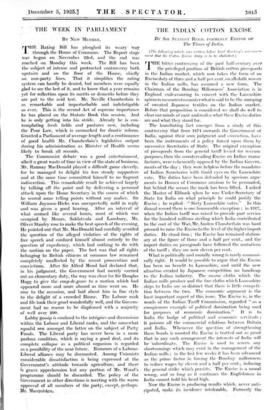THE WEEK IN PARLIAMENT
BY NEW MEMBER. THE _Rating Bill has ploughed its weary way through the House of Commons. The Report stage was begun on November 23rd, and the end was reached . on Monday this week. The Bill has been the subject of intense and protracted controversy both upstairs . and on the floor of the House, chiefly on nonparty lines. That it simplifies the rating system can. hardly be denied, but members were equally glad to see the last of it, and to know theta year remains yet for reflection upon its merits or. demerits before they are put to the acid test. Mr. Neville Chamberlain is as . remarkable and imperturbable and indefatigable as ever. - This is the second Act of supreme importance he has placed on the Statute Book this session. And he is only getting into his stride. Already he is con- templating fresh fields and pastures new, including the Poor Law, which is earmarked for drastic reform. Granted a Parliament of average length and a continuance of good health Mr. Chamberlain's legislative output during his administration as Minister of Health seems likely to break all records. The Communist debate was a good entertainment, albeit a great waste of time in view of the state of business. Mr. Ramsay MacDonald played a difficult game cleverly, for he managed to delight his less steady supporters *and at the same time committed himself to no flagrant indiscretiOn. ' This remarkable result he achieved largely by talking. off the point and by delivering a- personal attack upon the Home Secretary in the course of which he scored some telling points without any malice. Sir William Joynson-Hicks was unexpectedly mild in reply and was . given a good hearing. After an interval of what seethed like several hours, most of which was occupied by Messrs. SaklatVala and Lansbury, Mr. Oliver Stanley rose to make the best speech of the evening. He pointed out that Mr. MacDonald had carefully avoided the question of the alleged violation of the • rights of free speech and confined himself almost entirely to the question of expediency, which had nothing to do with the motion on the paper. The fact was that all rightS belonging 'to British citizens at common law remained completely unaffected by the recent prosecution and convictions. After Sir Alfred MOnd had declared that, in his judgment, the Government had merely carried Out an elementary duty, the way was clear for Sir Douglas Hogg to give the coup-de-grace to a motion which had appeared more and more absurd as time went on. He rose to the occasion, and laid about him in fine style to the delight of a crowded House. The Labour rank and file took their gruel wonderfully well, and the Govern- ment had no reason to be displeased with a majority of well over 200.
Lobby gossip is confined to the intrigues and dissensions within the Labour and Liberal ranks, and the somewhat squalid row amongst the latter on the subject of Party Funds. The Liberal party has never beed in a more parlous condition, which is saying a good deal, and its complete collapse as a political organism is regarded - as a possibility of the near future. RumOurs of a Labour- Liberal alliance may be discounted. Among Unionists considerable dissatisfaction is being expressed at the Government's attitude towards agriculture, and there is grave apprehension lest any portion of Mr. Wood's programme should be discarded. • The policy of the Government in other directions is meeting with the warm approval of all members of the party, except, perhaps, Mr. Macquisten.


































































 Previous page
Previous page